swell-project
Pseudonymization guidelines
The purpose of pseudonymization is to de-identify all information that can reveal the identity of the person who wrote the text. This information can include person names, age, addresses and phone numbers, city names and other geographical names, etc.
On top of this, some information is also marked as “potentially sensitive” during the pseudonymization process. This is information which does not in itself disclose the identity of the writer, but which would be particularly harming to reveal were the identity of the writer to be disclosed in spite of the de-identifying efforts. Sensitive information is for instance information on political or religious views of the writer. The information marked as potentially sensitive will be reviewed before publication of the corpus to evaluate whether it needs to be hidden or not.
Your task as an assistant is 1) to identify all information that can relate to the specific person who wrote the text, and categorize what type of information it is so that the person can be de-identified by changing/hiding the specific information, and 2) to mark potentially sensitive information related to the writer. The replacement of the personal information is performed automaticaly given the assigned label.
This document contains instructions for how to proceed.
Basic principles
-
Remove/change the information that can reveal a person behind the essay(s), yet keep to the minimal change rule. The data should be usable in research scenarios.
-
Data on deviations from standard Swedish will be lost for the pseudonymized strings (e.g. mis-spellings etc.). This also holds for text segments the form of which is dependent on the pseudonymized string (for instance prepositions preceeding pseudonymized city and country names, e.g. in Germany -> in Cuba).
-
Annotators have to make the assessment of the risks and needs for pseudonymization (an element of subjectivity).
-
Tokens should not be pseudonymized solely on the basis of them belonging to a specific category listed among the pseudonymization categories, but on the basis of them potentially revealing the identity of the writer. For instance, not all country or city names are pseudonymized, but only those which, together with the context, 1) may be connected to the writer (e.g. because the city may be identified as the writer’s home town), and 2) reveal information which is specific enough to be used to identify the writer. Accordingly, in a text where Istanbul is mentioned as a city where the writer has lived or as a city where a family member of the writer lives (etc.), Istanbul should be pseudonymized. But not so in a text providing general information about Istanbul. And while the information that the writer stems from the Baltic countries may be reason to pseudonymize Baltikum (as a region), the information that the writer stems from Europe does not necessitate pseudonymization, since Europe is such a large region which may be assumed to be the home region for a large number of potential writers.
-
Keep track of whether the token is “original” or “masked”. (This is done automatically by the annotating tool.)
- Categories that need to be marked in the texts, but not necessarily replaced. We will make an assessment later when we have enough statistics over the learners behind the essays, as well as the assembled texts and metadata on each particular writer:
- country: the same pseudonymization tag, < country >, is used for:
- country of origin (Jag kommer från Syrien versus Jag kommer från Luxembourg) - depending upon how many subjects in our database are from the named countries
- country of “intermediate” residence (Vi har stannat en månad i Turkiet)
- Note: Mentions of Sweden as a country of origin or residence are not marked. * number of family members (Jag har fem bröder och fyra systrar) - we will need to see whether it is a normal pattern in many essays. If yes - no masking/suppression is necessary * professions (Jag är webbutvikler) * education
-
Categories that can be used for discrimination, such as political views, religious convictions or sexual orientation, should also be marked (with the tag < sensitive >) without being masked right away. A decision will be made later in the process, before publication. E.g. I en dag såg vi en stor demstration det var för mycket människor vill inte Turkiets statsminister Ardogan och vi kände mycket glad för att det var första dag ser vi en fri demstration.
- Although information about languages spoken by the writer may help identifying the writer, such information is not pseudonymized, since this information is nevertheless included in the metadata which will be available for the corpus users.
Supra-categories
May be applied on top of other categories, as (extra)linguistic information.
Running numbers
Applies to all named entities (NE) and their @placeholders. Each unique named entity type (e.g.name) should get its own running number, starting with 1. If the same NE is repeated in the text, the same running number is assigned to it. This is done automatically, but the automatically assigned running number may be changed manually. A manual change of the running number is necessary when the same entity (for instance the same city) is referred to by non-identical strings (for instance due to mis-spelling).
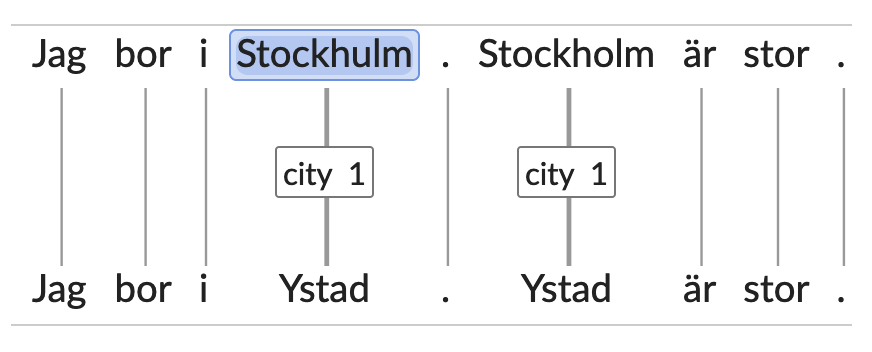
Morphology:
- Case: < gen > , e.g. Volvos
- Definiteness: < def > , e.g. Stadsbiliotekets
- Number: < pl > , e.g. Mölndalsbor
- Only marked forms are tagged, i.e. genitive case is marked, whereas nominative case is not (by default everything is assumed to have nominative case).

Pseudonymize:
1. Personal Names:
- Types: < firstname_male > , < firstname_female > , < firstname_unknown > , < initials > , < middlename > , < surname >
-
< firstname > vs < surname > are sometimes difficult to distinguish between. In uncertain cases, follow the standard Swedish order: < firstname > < middlename > < surname >
- Pseudonymization: (suggested source is from a national statistical agency: https://svn.spraakbanken.gu.se/sb-arkiv/lexikon/scb-namn , see more information at the bottom of this document)
- Provide a list with first names, male, female and gender neutral (incl. international).
- For surnames, gender-specific types, when unclear use gender-neutral names
- Provide a list with surnames (incl. international)
- Middlenames: Replace with an initial “A”
- Initial replaced by “A”, keep delimiters
- To consider:
- allow cross-reference/anaphora resolution, i.e. allow to keep track of the entities that the L2 learner refers to, e.g. if more than one unique name occurs in the text, each unique name shall be replaced by a unique pseudonym. This is handled automatically, through the procedure with running numbers (see above).
- random substitution for each unique name in the text given a list of names or
- select a few names (while keeping the gender and cross-reference info) and use these names - throughout all texts
2. Geographic data (country, city, zip codes, area names, …)
- Types: < foreign >, < area > , < city > , < geo > , < country > , < place > , < region > , < street_nr >, < zip_code >
- < foreign > : this tag is combined with the following tags when applied to places outside of Sweden: < region > , < city >, < place > , < geo >. For places in Sweden the same four tags are used without the additional tag < foreign >.
- < country > : except Sweden
- < zip_code > : zip/area code
- < region > : geographical/political unit larger than a city but not equivalent to a country. E.g. Sörmland, Stockholms län, Region Blekinge, Svealand, Sydirak, Toscana, Baltikum. Regions outside of Sweden are marked with the additional tag < foreign >.
- < city > : the tag < city > is used for a large category of populated areas, including cities, urban districts both larger and smaller than cities, and villages. Cities outside Sweden are marked with the additional tag < foreign >.
- < area > : part of a city, e.g. Vesterbro, Greenwich village. The tag < area > is only used for non-Swedish settings, and is always (reduntantly) combined with the tag < foreign >. (For Swedish settings the tag < city > is used also for city parts.)
- < place > : specific place, street, square, bridge, name of a bus/tram/metro stop. Places outside Sweden are marked with the additional tag < foreign >.
- < geo > : This tag is used for any additional type of geographic name not among the other categories, for instance forests, lakes, mountains, etc. Geographical names referring to entities outside Sweden are marked with the additional tag < foreign >.
- < street_nr > : street or place number
- Uncertain categorization:
- In some cases local knowledge or extensive research is needed in order to determine the most suitable category for a geographic name: It may be hard to figure out whether a name rather refers to a region or to a city, to a city or to an area, etc. Such extensive research is not motivated by the objective of the pseudonymization; what’s important is that information potentially revealing the identity of the writer is pseudonymized, and that the categorization (and subsequent replacement) of the pseudonymized entities in the text are consistent with the rest of the information given in the text.
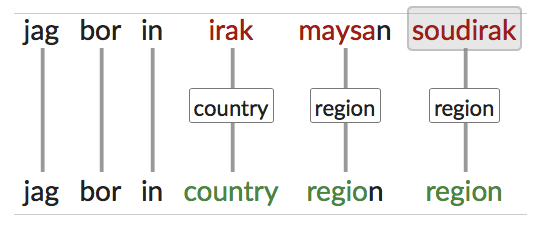
- Pseudonymization: (suggested source: http://www.geonames.org , see more information at the bottom of this document)
- Random substitution given a list of named entities of various attributes for each attribute, except for Sweden
- < zip_code >: ABCDEF alt Replace letters with ABC and each number with 0 (ABC 0000), keep the delimiter
3. Institution: < school > , < work > , < other_institution >
- The institution tags are used to pseudonymize institutions mentioned in the texts which may be used to identify the writer, such as the school, work or sport’s team of the writer (or a person related to the writer).
- < school > is used for all education-providing institutions (primary school, secondary school, university, etc.)
- < work > is used for an institution which is revealed as the writer’s working place (or the working place of a person related to the writer). When an institution is identified as a working place, the tag < work > is applied instead of other tags which may otherwise be applied. For instance: If a text reveals that the writer works in a named school, the tag < work >, rather than the tag < school >, is used to pseudonymize the name of the school.
- < other_institution > is used for all other institutions in need for pseudonymization, such as a sport’s team or an NGO
- Pseudonymization:
- Replace from a list of school names and companies (e.g. from Yellow pages) alternatively use A-school, B-workplace, C-institution
4. Transportation: < transport_name >, < transport_nr >
- < transport_name >: used for transport lines or transport systems with specific names, e.g. gröna linjen, Lidingöbanan, Pågatågen
- Tvärbanan, and similar words which may be interpreted both as type nouns and as names for specific lines, are pseudonymized with this tag.
- Words which clearly refer to transportation types rather than to specific lines, such as tunnelbana, buss, pendeltåg etc. should not be pseudonymized, although some of them reveal a city or limit the number of possible cities.
- < transport_nr > : used for the number of a specific line, e.g. “buss 528”, “linje 3”. The tag should be placed only on the number.
- Pseudonymization:
- < transport_name > : Replace with A-linjen, B-linjen etc. to avoid adding inconcistensies into the text
- < transport_nr > : Replace actual number with 1, in case of several numbers in the same text, enumerate (1, 2, 3…)
- Note: Names of stations and stops, such as Mariatorget, Centralen, are pseudonymized with the tag < place > in the geographic data group.
5. Age: < age_digits >, < age_string >
- Person’s age (e.g. 18 years old)
- Pseudonymization:
- Change the year within the range of numbers in 5-year interval. If an author writes 18 y.o., provide a number from a range of numbers < age > (+ - 2) - > e.g. 16-20. (This is done automatically by the annotation tool.)
- The same as above applies to < age_string > , rendered in strings. The actual implementation of this pseudonymization category remains to be figured out.
- ( There is a complication, though: if for example age is written in letters (and also misspelled, like “niotton” or “sIxtton”), then automatic replacement becomes nontrivial. We need to have an option to add “pseudonimyzation” manually directly in the tool by rewriting the target token. At the moment this is not possible. Another issue with this is that misspelling can be pretty bad and there is a need for “interpretation” by an assistant, e.g. “åttonde” år (elder sister) versus “tionde” år (little sister). Added as an issue for anonymization tool. (Elena, A10AT1) )
6. Dates (all elements directly related to an individual, day, month, year)
- Types: < date_digits > , < day > , < month_digit >, < month_word >, < year > . //: #
- Pseudonymization: Ideally - keep the delimiters as in the original (, . - /)
- < day > - > random number between 1-28
- < month_digit > - > random replace 1-12
- < month_word > - > random replace: januari, februari, …
- < year > - > 5-year interval: e.g. 2013 is replaced by a random number from a range of numbers (+ - 2), i.e. 2011-2015
- < date_digits > - used for all dates that are written as a sequence of numbers with delimiters. Replace all numbers with “1” to a standard from 11-11-1111, (keeping delimiters not implemented) e.g.
- 2018-12-01 –> @date_digits –> 1111-11-11
- 18/01/12 –> @date_digits –> 11-11-1111
- 180112 –> @date_digits –> 11-11-1111
- 18.01.12 –> @date_digits –> 11-11-1111
- 01/12 –> @date_digits –> 11-11-1111
7. Phone numbers < phone_nr >
- Pseudonymization:
- Replace each number with a “0” in the sequence (e.g. 0000-000000) (and keep the delimiter)
8. Email addresses < email >
- Pseudonymization:
- One single for all: email@dot.com
9. [personal] web pages (URL) < url >
- Pseudonymization:
- Replace all with url.com
10. Social security numbers < personid_nr >
- Pseudonymization:
- Replace each number with 123456-0000 (and keep the delimiter (-) )
11. Account numbers < account_nr >
- Pseudonymization:
- Replace each number with 0 (and keep the delimiter(s))
12. Certificate/licence numbers (e.g. vehicle) < license_nr >
- Pseudonymization:
- Replace letters with ABC and each number with 0 (ABC 0000)
13. Other sequence of numbers < other_nr_seq >
- Pseudonymization:
- Replace each number with 0 (and keep delimiters)
14. Extra (something else, not covered in the previous categories)
- When the pseudonymizer comes across some kind of information in a text which may potentially be used to identify the writer, but which is not covered by any of the other pseudonymization categories, the tag < extra > is used.
- The < extra > tag may for instance be used to mark information about very specific events in the writer’s life.
- By default we consider all “Extra” tags as obligatory to pseudonymize. However, the intention is to re-evaluate the category after the initial pseudonymization and see whether there is a need to separate between obligatory and non-obligatory pseudonymization of “extras”.
15. Mark up but do not pseudonymize:
- < prof >, professions, e.g. webbutvecklare
- < edu >, education: Use for degrees etc., e.g. datavetare, “jag har en examen i kemi”
- < fam>, family members: Use for words for family members, friends, etc., e.g. mamma, farfar, son, kusin, kompis, vän.
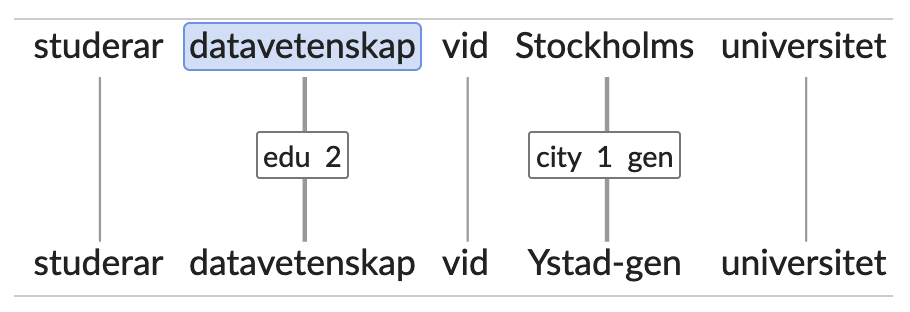
- < sensitive >, sensitive information:
- Markup: assign a “sensitive” @placeholder to at least one token per sentence. When deciding which and how many tokens to mark with the < sensitive > label, a guiding principle is that pseudomization of the marked tokens could potentially suffice. However, the whole sentence will be reviewed later on before final decisions about these pseudonymizations are made, and fewer rather than more tokens should be marked. A possible solution for the example below is to mark the tokens “glad”, “fri” and “demstration”.
- Note: Sensitive information which could be covered by other pseudonymization categories should be assigned these other labels, e.g. “Turkiet” and “Ardogan” in the example below.
- Consider in the future: for < sensitive > we need to evaluate if subgroups are needed: e.g. religion, ethnicity, sexual orientation, political views, physical and mental disabilities
Example:
I en dag såg vi en stor demstration det var för mycket människor vill inte Turkiets statsminister Ardogan och vi kände mycket glad för att det var första dag ser vi en fri demstration.
–>
I en dag såg vi en stor demstration det var för mycket människor vill inte Turkiets < country, genitive > statsminister Ardogan < surname > och vi kände mycket glad < sensitive > för att det var första dag ser vi en fri < sensitive > demstration < sensitive >.
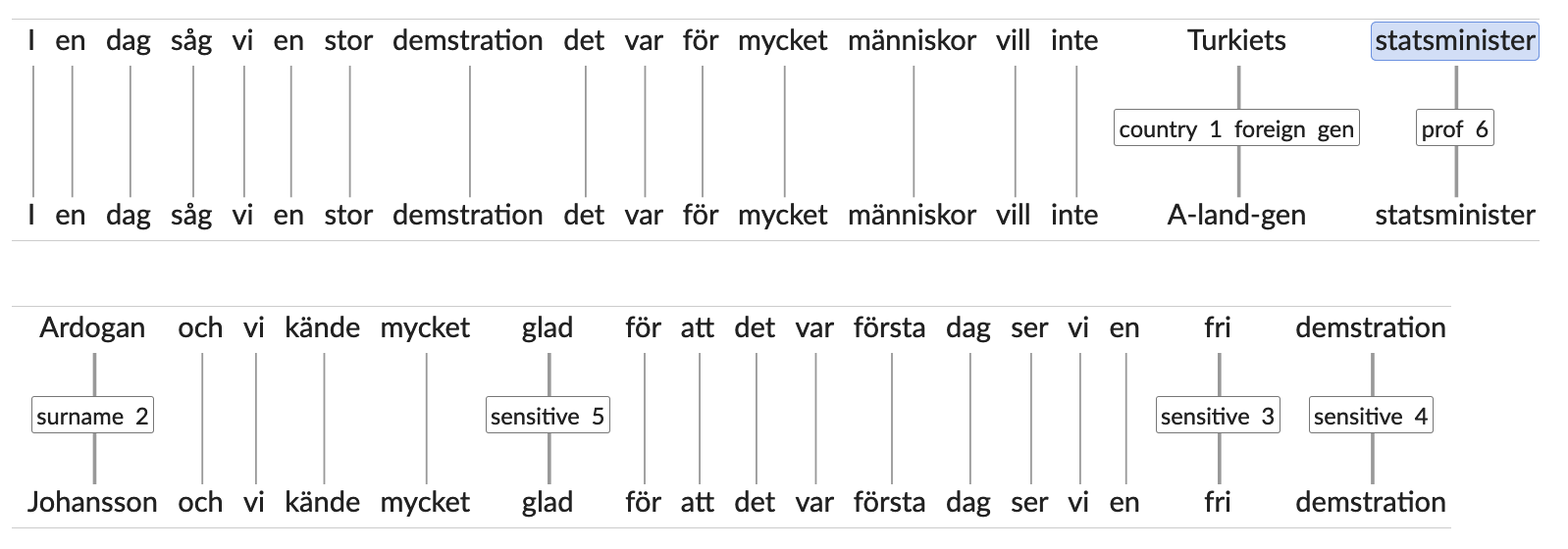
16. Comments < OBS! >, < Com! >, document comments
- The < OBS! > tag is used for marking a place to return to or for making comments which may be useful for later stages in the work with making the text ready for the corpus release (i.e. normalization and correction annotation).
- The < Com! > tag is used for marking specific text sequences in need of comments which are judged to be useful for the future users of the corpus and which are thus intended to be kept in the published corpus.
- Both the < OBS! > tag and the < Com! > tag are connected to an “edge comment” field where notes may be made. The label(s) get red-pink background for easier identification when there is a need to return to it/them.
- There is also a document comment field in which notes about the text as a whole may be made. These notes may provide essential information for later stages (normalization, correction annotation), or in some cases information which is meant for the corpus user and which is thus meant to be kept in the published corpus.

Text example
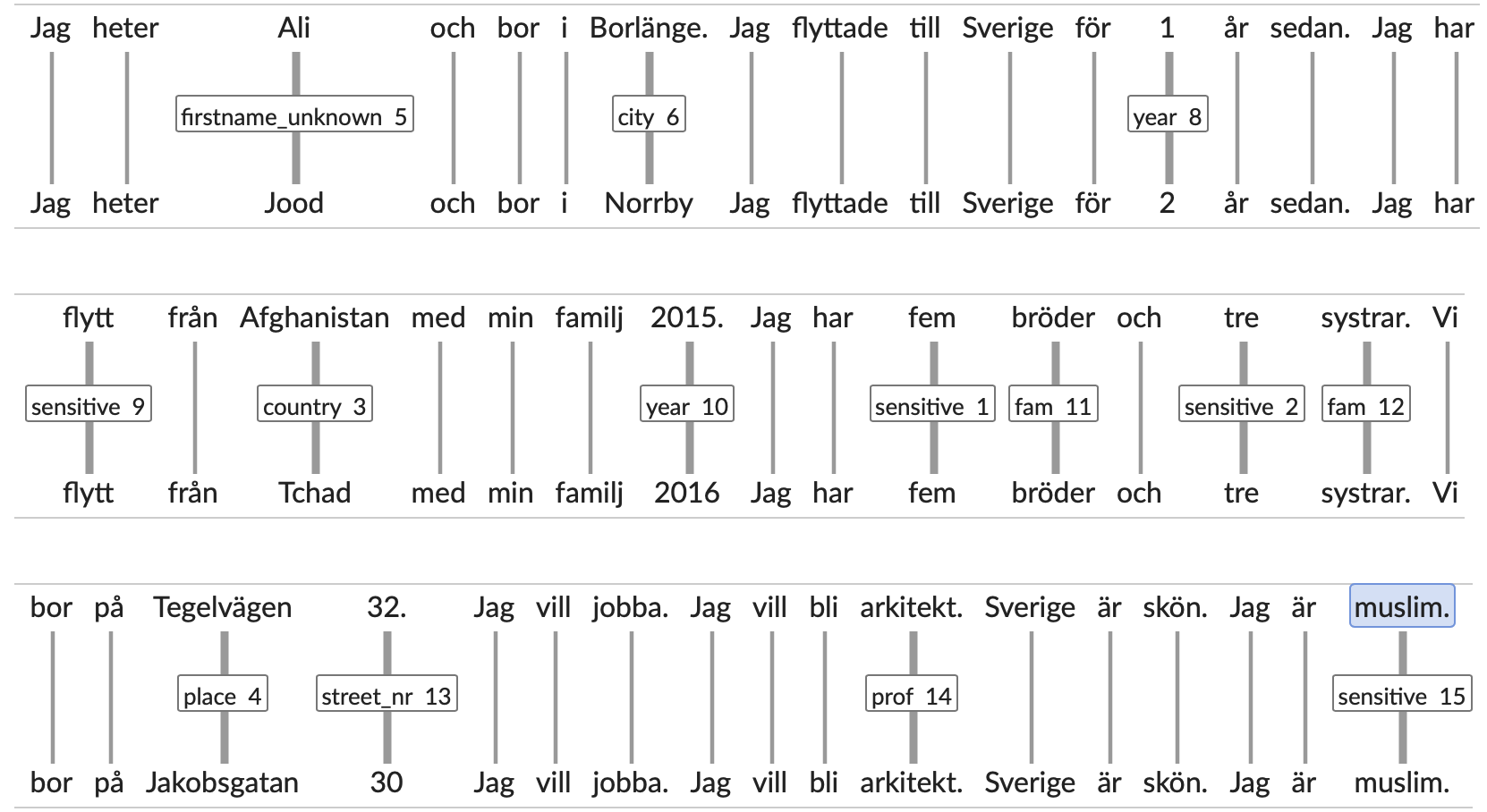
Resources (lists) for pseudonyms and automatic pseudonymization scripts
Resources and lists are collected in a private repository here: https://github.com/SamirYousuf/LR_project
SweLL annotation tool
SVALA is used for both manual annotation and for supportive automatic pseudonymization. A demo-version of the tool can be found here: https://spraakbanken.gu.se/swell/dev/#
Manual for SVALA: coming
SweLL publications on the topic
-
Beáta Megyesi, Sofia Johansson, Dan Rosén,Carl-Johan Schenström, Gunlög Sundberg, Mats Wirén & Elena Volodina. (2018). Learner Corpus Anonymization in the Age of GDPR: Insights from the Creation of a Learner Corpus of Swedish. Proceedings of the 7th NLP4CALL workshop. [https://ep.liu.se/ecp/152/006/ecp18152006.pdf]
-
Elena Volodina, Yousuf Ali Mohammed, Arild Matsson, Sandra Derbring, Beatá Megyesi. (2020). Towards Privacy by Design in Learner Corpora Research: A Case of On-the-fly Pseudonymization of Swedish Learner Essays. COLING-2020. [pdf-link comes later]
-
Wirén Mats, Arild Matsson, Dan Rosén, Elena Volodina. 2019. SVALA: Annotation of Second-Language Learner Text Based on Mostly Automatic Alignment of Parallel Corpora. CLARIN-2018 post-conference volume. LiUP Press. [https://ep.liu.se/ecp/159/023/ecp18159023.pdf]
http://download.geonames.org/export/dump/readme.txt
http://download.geonames.org/export/dump/readme.txt